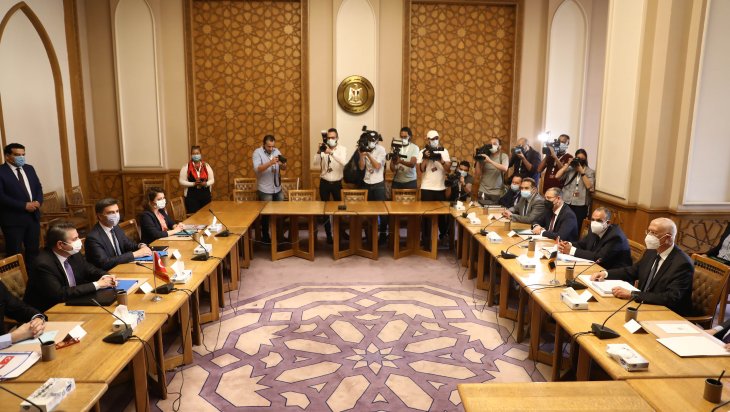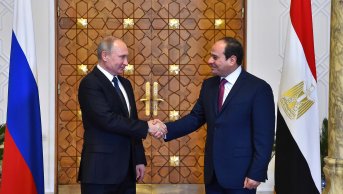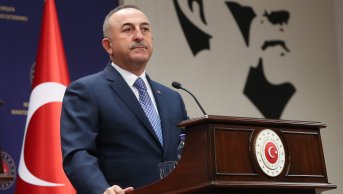Second Round of Turkish-Egyptian Exploratory Talks within the Framework of Regional Crises

The future of Turkish-Egyptian normalisation talks will be hitting a new milestone on 7-8 September as an Egyptian delegation, led by Deputy Foreign Minister Hamdi Loza, upon the invitation by the Turkish Ministry of Foreign Affairs, will travel to Ankara in order to conduct a second round of exploratory talks between the two countries. The latest round of talks was initially announced in a statement by the Egyptian Foreign Ministry and later by the Turkish Foreign Ministry, both stating that bilateral relations, as well as a few regional issues, would be discussed during the two-day meetings. These exploratory talks come amid several key developments, highlighting the importance of discussions between Turkey and Egypt.
Normalization between Ankara and Cairo
Earlier this year, on 5-6 May, Turkey and Egypt held their first high-level talks in eight years, as a Turkish delegation travelled to Cairo under the leadership of Turkey’s Deputy Foreign Minister Sedat Önal. The two countries, which have been on opposing sides since the 2013 Egyptian coup d’état, had finally kickstarted negotiations for normalisation after many hints before the talks. The first signals of the possibility of such a process emerged from public statements made by Turkish authorities. On 8 March, Turkish Presidential Spokesperson Ibrahim Kalın expressed that Ankara could open a new page in its relations with Cairo if both sides take constructive steps towards regional peace and stability. Just four days after this statement, Turkish Foreign Minister Mevlüt Çavuşoğlu announced that Turkey have established contact with Egypt at both intelligence and foreign ministry levels. Çavuşoğlu also stated that contacts between the two countries began at the diplomatic level. These announcements paved the way for the first exploratory talks in early May that touched upon issues at the bilateral and regional level, most notably those regarding Libya, Syria, and the East Mediterranean.
In the process leading up to the exploratory talks, the parties showed their willingness to discuss such crises in their statements. The Libya issue was undoubtedly a crucial aspect of the exploratory talks for both Turkey and Libya, as Ankara’s involvement in the Libyan conflict in support of the UN-recognized government in Tripoli raised concerns for Cairo over its national security. Turkish Presidential Spokesperson Ibrahim Kalın said talks between Turkey and Egypt, the two crucial actors in Libya, would help renew ties between the two countries while also facilitating efforts to bring peace to Libya. This subject is also in connection with the disputes seen in the East Mediterranean, where Cairo is at odds with Ankara over Egypt’s support for the maritime claims of Greece and its shared objection with Athens towards Turkey’s maritime agreement with the Libyan Government of National Accord (GNA). Another topic explicitly mentioned following the first round of discussions was Syria. In a joint statement released by both countries, it was expressed that frank and in-depth discussions were held on regional issues, including Syria. The tensions that occur now and then between Ankara and Cairo are mainly related to the subjects mentioned above.
Upcoming talks and possible topics of discussion
In the context of regional crises, the upcoming round of exploratory talks between Turkey and Egypt will likely feature similar topics of discussion, while possibly touching on others that have recently emerged. One of the primary subjects most likely to come up is the latest situation in Libya. As one of the essential points of divergence between Turkey and Egypt, Libya will undoubtedly prove to be a crucial topic for the two countries for the foreseeable future. This is based on the country's importance in the foreign policy objectives of both Ankara and Cairo, regardless of the differences in the values attributed. Whether any progress can be achieved in this regard is a matter that will remain to be seen, as the situation in Libya is a forefront priority in the foreign policies of both countries, where room for exploring common grounds is limited. In this regard, Turkey values the agreements it has concluded with the GNA, which have also been carried over to the current Government of National Unity. On the other hand, Egypt wishes to secure its western border against instability and foreign influence. A common point of convergence between the two states is their desire for security and stability in Libya in order to establish a favorable environment for commerce and investment. The two states can potentially make progress in this regard.
The ongoing tensions witnessed in the East Mediterranean are likely to be addressed during the exploratory talks in the coming days. Similarly to the case of Libya, Turkey devotes significant attention to the energy dispute in the East Mediterranean as the country with the longest coastline in the region. In this regard, from the perspective of Ankara, the essential reason for tensions in the region is its differing interpretation from Greece of continental shelves in the East Mediterranean and the Aegean Sea. For Egypt, maritime boundaries are not as important, though they are crucial in terms of energy transportation to Europe. Like Ankara, Cairo intends to become an energy hub in delivering oil and natural gas to Europe. Within this context, Egypt’s participation in the East Mediterranean Gas Forum, as well as its initiatives to be a part of the EastMed pipeline project aimed at delivering natural gas to mainland Europe through the island of Cyprus, are an indication of the country’s long-term objectives. Exploratory talks on this topic between Turkey and Egypt possess much more room for dialogue than Libya. Based on Turkey’s interpretation of the highly disputed region, potential convergences between the two countries could offer significant economic possibilities, especially for Cairo. Though, the extent of these possibilities will be affected by the Egyptian-Greek relations, which have recently experienced positive developments.
Another probable subject of concern in the upcoming exploratory talks, in addition to those discussed in the previous round, will be the latest situation in Syria. Syria’s place in Turkish foreign policy is crucial, not only due to its geographical proximity but also to its economic, strategic and humanitarian significance. While this is not as important for Cairo’s foreign policy, it most certainly has a place within its understanding of ‘Arab national security’ described consistently in Egyptian rhetoric regarding regional tensions and instabilities. However, a more pressing subject that may emerge in the second round of talks, more specifically from Egypt’s point of view, could be the latest high-level visits by Sudanese and Ethiopian leaders to Turkey. The reiteration, in official visits by Transitional Council Chairman Abdel Fattah al-Burhan and Prime Minister Abiy Ahmed to Ankara, of Turkish-Sudanese and Turkish-Ethiopian ties, respectively, may disturb Cairo, especially since Egypt has tensions with Addis Ababa over disagreements on the operation of the Grand Ethiopian Renaissance Dam (GERD). This topic will likely be addressed in some way or another, especially since these developments have put Turkey in the midst of growing Egyptian-Ethiopian tensions, fueled by Ethiopia’s unilateral approach on the matter as well as Egypt’s concerns on the diminishing water flow downstream.
In conclusion, within the framework of regional crises observed in the region, the latest round of exploratory talks between Turkey and Egypt will likely include foreign policy matters previously discussed before in the first round of negotiations between the two countries in May. On the other hand, unlike the previous round of talks, it may feature discussions on the recent diplomatic talks hosted by Ankara together with Khartoum and Addis Ababa, even though this may not be at the forefront of the upcoming discussions.










